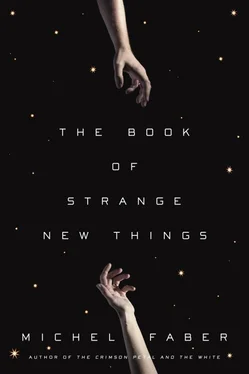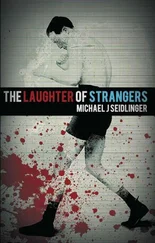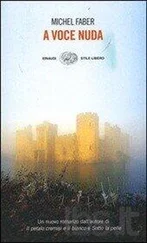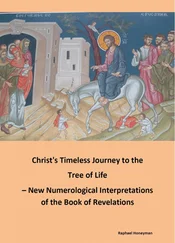‘I didn’t mean… I wasn’t saying… ’ Peter floundered. Then: ‘I just want to know you better.’
‘You know enough,’ Lover One said. ‘ We are they who need more knowing, more word of Jeสีuสี. Word of Jeสีuสี good. Our word no good.’ And no amount of reassurance could convince him otherwise.
So here they were, a congregation within a congregation, engaged in an activity that had a slightly contentious status — which made it feel more important, of course. They sat on a patch of earth which had been shrouded in shade when they first settled in it, but not anymore. How many hours had they been sitting here? He didn’t know. Enough for the sun to move a significant distance across the sky. The sun’s name, he’d learned, was ڇ. Back at the USIC base, stowed in a drawer in Peter’s quarters, lay a printout prepared for him by some well-meaning boffin, charting the rising and setting of the sun within the 72-hour diurnal cycle. The heavens were reduced to a geometric grid with USIC at its centre; the times of day were represented as incomprehensible multi-digit numbers, and the sun was not dignified with a name. Typical.
Now, under that sun, he sat with his brethren on the mildest, most beautiful day yet. He imagined the scene from above — not very high above, but as if from a beach lifeguard’s observation tower. A tanned, lanky, blond-haired man in white, squatting on brown earth, encircled by small robed figures in all the colours of the rainbow. Everyone leaning slightly forward, attentive, occasionally passing a flask of water from hand to hand. Communion of the simplest kind.
He hadn’t felt like this since he was six and his parents took him to the dunes in Snowdonia. That summer had been the happiest time of his life, as he’d luxuriated not just in the balmy weather but also in his parents’ reconciliation, all coos and hugs and soft words. Even the name ‘Snowdonia’ seemed magical, like an enchanted kingdom rather than a national park in Wales. He’d sat for hour upon hour in the dunes, soaking up the warmth and his parents’ togetherness, listening to their beningnly meaningless chatter and the lapping of the waves, gazing out at the sea from under his oversized straw hat. Unhappiness was a test that you had to pass, and he’d passed it, and everything would be all right from now on. Or so he’d thought, until his parents’ divorce.
The language of the สีฐฉั was murder to pronounce but simple to learn. He had a hunch that there were probably only a few thousand words in the vocabulary — certainly far fewer than the quarter million in English. The grammar was logical and transparent. No eccentricities, no traps. There were no cases, no distinctions between singular and plural, no genders, and only three tenses: past, present and future. Even to call them tenses was a stretch: the สีฐฉั didn’t think that way. They classified a thing according to whether it was gone, or it was here, or it was expected to come.
‘Why did you leave the original settlement?’ he asked, at one point. ‘The place where you were living when USIC first came. You left it. Did something go wrong between you and USIC?’
‘We are here now,’ they replied. ‘Here good.’
‘But was there a problem?’
‘No problem. We are here now.’
‘It must have been very difficult to build everything again, from nothing.’
‘Building no problem. Every day a สีmall work more. สีmall work upon สีmall work, day upon day, then the work done.’
He tried a different tack. ‘If USIC had never come, would you still be living in the original settlement?’
‘Here good.’
Evasiveness? He wasn’t sure. The สีฐฉั language didn’t appear to contain any conditionals. There was no if.
The home of my Father have room upon room upon room , read one of his Bible paraphrases, carefully refashioned to avoid troublesome words like ‘house’ and ‘mansions’. As for John’s next bit, ‘if it were not so, I would have told you’, he’d ditched it and moved straight on to I will prepare a room for you — which in retrospect was a wiser decision than he’d known at the time, because the สีฐฉั wouldn’t have understood what John’s ‘if it were not so’ assurance was supposed to mean. One of the most direct, straight-talking asides in the whole Bible was arcane nonsense here.
And yet, however many problems the สีฐฉั might have with English, it was agreed that Peter would continue to speak of God and Jesus in his own tongue. His flock would have it no other way. The Book of Strange New Things was not translatable, they knew that. In foreign phrases, exotic power lurked.
But there was more to life than God and Jesus, and Peter wanted to share these people’s mundane reality. Just a few days after he started to learn the language, he overheard two Jesus Lovers talking, and was delighted to pick up, amongst the meaningless sussurus, a reference to a child refusing breakfast, or maybe not refusing, but doing something with or at breakfast that the grown-ups disapproved of. It was a trivial detail, and his understanding of it made no difference to anything, yet it made a huge difference to how he felt. In that modest moment of comprehension, he was a little less an alien.
‘Breakfast’ was ‘ڇสีน รี่ณ สค’ — literally, ‘first food after sleep’. A great many สีฐฉั words were composites of other words. Or maybe they were phrases, it was hard to tell. The สีฐฉั made no distinction. Did that mean they were vague? Well, yes and no. He got the impression there was a word for every thing — but just one. Poets would have a hard time here. And a single word might refer to an activity, a concept and a location all in one, as in สสีณ, which referred to the whiteflower fields, whiteflower in general, and the farming of the crop. Pronouns didn’t exist; you just repeated the noun. You repeated a lot of things.
‘สครี่ สีฐ?’ he asked Jesus Lover Twenty-Eight one day, proud that he could manage ‘Your child?’ in the สีฐฉั language. A small person, clearly not yet mature, was dawdling near the church, waiting for her to finish her worship and return home.
‘ณ,’ she confirmed.
Observing the child, he felt sad that there were no children in his congregation. The Jesus Lovers were all grown-ups.
‘Why don’t you keep him by your side?’ he asked. ‘He’s welcome to join us.’
Ten, twenty, thirty seconds went by while they stood there, watching the child watch them. A breeze fluttered the boy’s cowl, and he raised his tiny hands to adjust it.
‘He no love Jeสีuสี,’ Jesus Lover Twenty-Eight said.
‘He doesn’t have to,’ said Peter. ‘He could just sit with you, listen to the singing. Or sleep.’
More time passed. The boy stared down at his boots, shifting his weight from one foot to the other.
‘He no love Jeสีuสี,’ Jesus Lover Twenty-Eight said.
‘Maybe in the future.’
‘Maybe,’ she said. ‘I hope.’ And she walked out of the church into the shimmering heat. Mother and son fell into step without a word. They didn’t hold hands, but then สีฐฉั seldom did.
How much did her child’s lack of Christian fellowship grieve her? How contemptuous or tolerant was this boy of his mother’s faith? Peter couldn’t tell. And asking Lover Twenty-Eight about it probably wouldn’t yield much insight. The lack of self-absorption he’d noted in these people from the outset went deep into the language itself: there were no words for most of the emotions that humans devoted endless energy to describing. The sort of intimate confab that longtime girlfriends indulged in, analysing whether a feeling was True Love or merely lust, affection, infatuation, habit, dysfunction, blah blah blah, was inconceivable here. He couldn’t even be sure if there was a word for anger, or if ‘รี่ฉ้ณ’ merely denoted disappointment, or a neutral recognition that life wasn’t turning out as planned. As for ‘ฉนณ’, the word for faith… its meaning was not what you’d call precise. Faith, hope, intention, objective, desire, plan, wish, the future, the road ahead… these were all the same thing, apparently.
Читать дальше












